There are many stories associated with Sinai, from the tales of St. Catherine to those of Prophet Moses, as well as numerous other stories tied to different religions. Yet, the stories that are rarely mentioned, or even highlighted, are perhaps the most relevant to our times: the story of the Egyptian Bedouin, of humanity’s relationship with nature, and of the ancient nomad that lives within us all.
It is a story that lives within us, but one that is only unlocked when a person truly and willingly chooses to embark on a hiking journey and embrace the full nomadic Bedouin lifestyle.
Beyond the spirituality, the religious stories, and the sacredness of the place, the story of Sinai is, at its core, a story for all of us, taking us back to the raw nomadic lifestyle which, even to this day, holds a depth of knowledge and wisdom.
And to tell this story, it only feels right that it be said by a Bedouin who has lived it for most of his life.
Before founding his own team of hiking guides, Sinai Hikes, 28-year-old Ahmed Mousa was a Bedouin from the Jebeleya tribe in south Sinai. For centuries, the Jebeleya tribe were known to be skilled gardeners, relying on the mountains’ ecosystems to sustain their way of life, and were also guardians of the St. Catherine monastery since the 6th century.
After years guiding hikers and leading tours at St. Catherine’s monastery, and learning the art of guiding as a teenager alongside his uncle, Mousa went on to establish a hiking team that is 100 percent Bedouin-led. Not only do they manage every aspect of the work, from logistics to marketing, but they also ensure that it remains fully Bedouin-led.
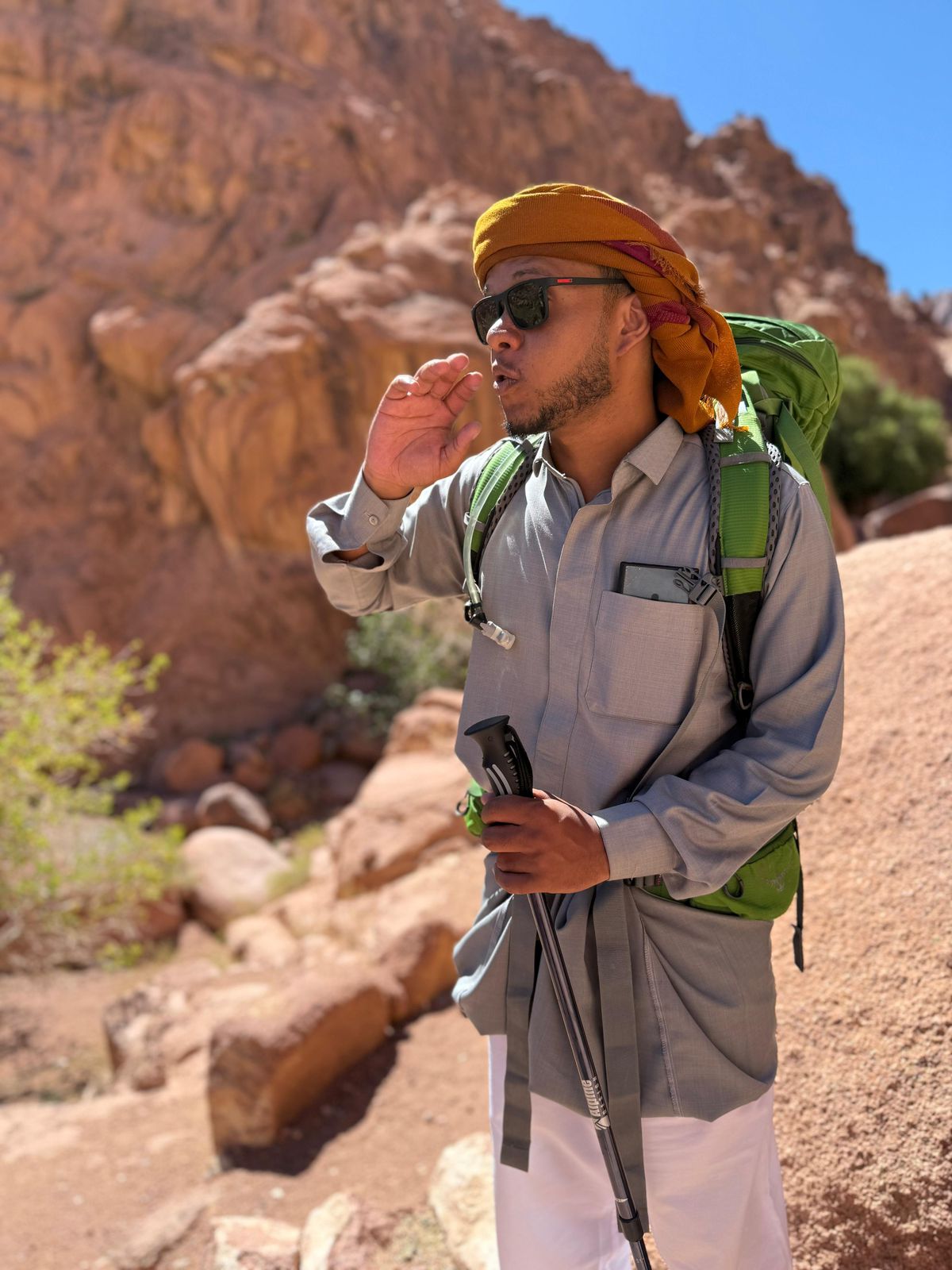
“Bedouins have been hiking with tourists for years, long before many modern tourism companies,” Mousa tells Egyptian Streets. “We started out organically, without the marketing or media expertise. Today, we’re learning how to build a fully organized, 100 percent Bedouin-led team dedicated to supporting our Bedouin families in the area.”
Mousa represents a new generation of his community that is reshaping Egypt’s tourism, particularly hiking tourism, where Bedouins are not only central to the story but also the true leaders of it. They are working for themselves and their families, giving tourists a window into the authentic soul of their lifestyle.
Since joining Startup Haus, an ecosystem designed to empower entrepreneurs, Mousa’s Sinai Hikes has evolved into a modern, eco-conscious venture that honors the ancient heritage of the Bedouin community while adopting sustainable practices like recycling.
“I decided to open Sinai Hikes while hiking in the mountains in 2022,” Mousa says.
“I’ve always made my toughest and most life-changing decisions while hiking. For me, as a Bedouin, hiking is a form of personal transformation. You always come back different, with new thoughts or a new perspective.”
Finding the nomad within
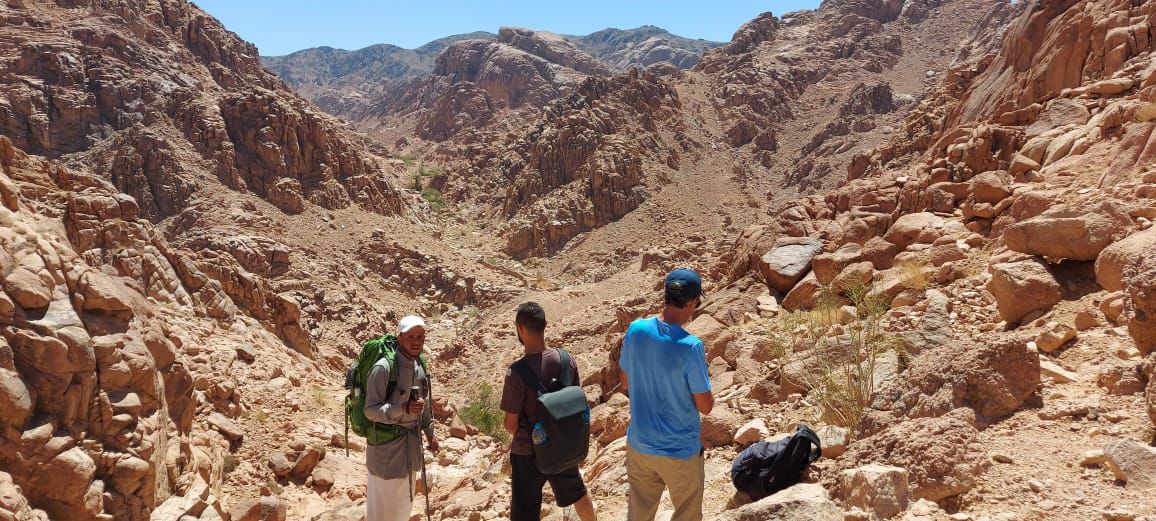
What makes Sinai’s hiking trails unique is that they all connect into one trail and path. The journey feels seamless and uninterrupted, flowing like one wave into the next. The beauty also lies in the untouched mountains, still holding the traces of ancient journeys and nomads who once walked them.
“When you walk these trails, you’re walking in the footsteps of the ancients through history, and through old Bedouin villages left behind, their homes and surroundings still untouched. It remains raw and protected, just as it was centuries ago,” Mousa says. “Hiking here is like uncovering the nomad within yourself, because nomads have existed long before civilizations.”
As we set off early on our first morning, beginning a 12-kilometer trek through the valleys toward Mount Abbas Basha, I kept reflecting on the idea of uncovering this ‘ancient nomad’, an inner past self waiting to be found.
Along the way, the answers to my reflection began to reveal themselves when we passed the humble home of Um Saad, a 72-year-old Bedouin woman who built her life among the mountains in complete seclusion. There, with no one in sight but herself, her garden, and a few workers, she has not only created her own home but is also building a mosque, the first ever to be established in that remote area.
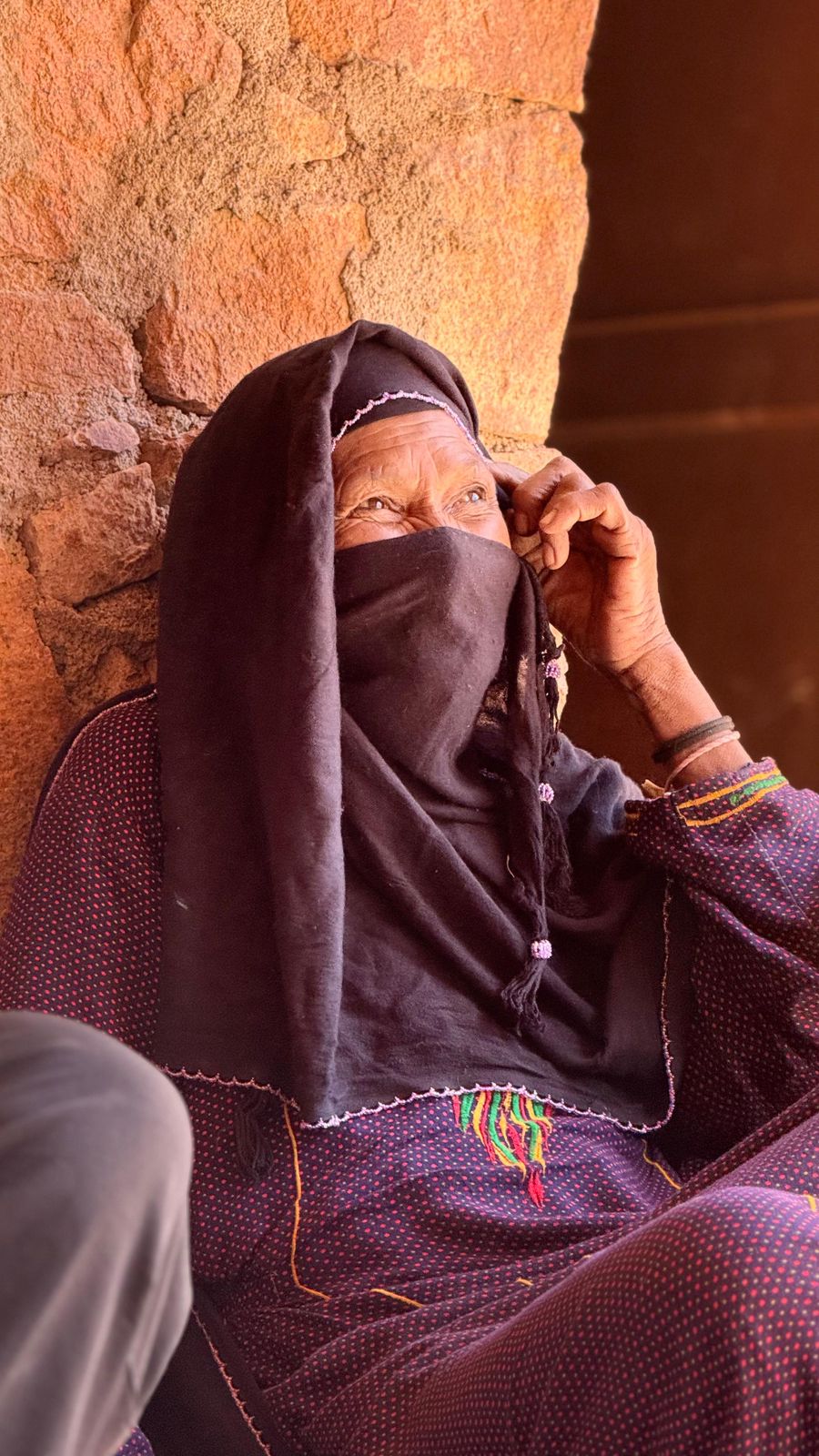
When I asked her why she chose to leave the city behind and build her home here, she smiled and replied, “Mountains are a blessing; they are so special and precious to me.”
She spoke of the mountain as though it were a friend or a member of her family, living right beside her. And while we all thought she was alone in the mountains, it became clear to me that she is not, because for her, nature is both a companion and a protector.
“Because of Um Saad, more people are now following her example, leaving the city to build their own homes in the mountains,” Mousa says. “There is a growing trend of Bedouins returning to this simple way of life in the mountains.”
Yet, why would they return, I wondered. Why leave everything behind to live in nature, where the only sounds are the crisp air, the birds, and their own voice?
For Um Saad, the answer is simple. Here in the mountains, she feels completely free and independent. Each morning, she lives by her own rules, harvesting food from her garden, then walking in the mountains or sitting quietly to admire the beauty of Sinai’s landscape.
In the depth of her eyes and voice, I found a glimpse of my own inner ancient nomad; a life where humans were free of distractions, close to what was real and alive, living among the mountains as though they, too, were human and meant to be cared for.
“The ground is a blessing,” she told me. And it is true. The very ground we walk on is a blessing, one we should always feel grateful for.
After leaving Um Saad, I carried her gems of wisdom with me. Just before we began the ascent to the peak of Mount Abbas Basha, I looked more deeply at the mountains and at the ground beneath my feet. I felt grateful to exist in such beauty, in a place where all of it is freely given.
Nature has always offered its gifts without asking for anything in return, and yet we often forget to thank it back.
At the peak of Mount Abbas Basha, a breathtaking view unfolded before me, layers of mountains stacked upon one another, each with its own story, its own shape, its own character. Like Um Saad, I looked more deeply at them and paused to appreciate the blessing of simply existing within such a work of art.
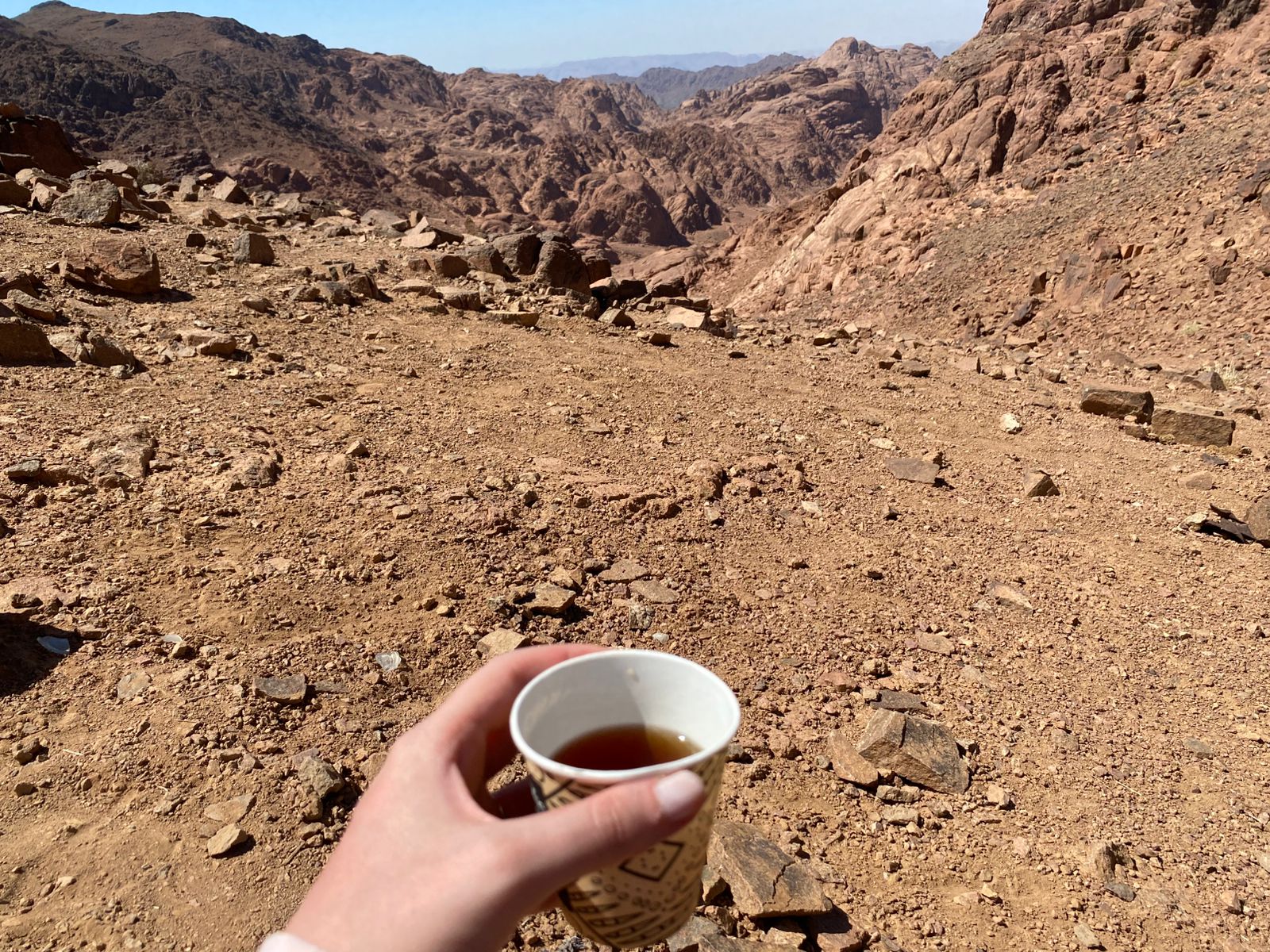
As I reflected on the beauty of the mountains, we were served a warm cup of tea and a light, wholesome lunch of salad, baba ghanoush, and hummus. Sitting at the mountaintop with my tea in hand, I began to reflect on my life back in the city, and how much clearer my mind and body feel here.
The ancient nomad within us still remembers what it feels like to wake each morning and look to the skies instead of our phones, to grow food rather than only consume it, and above all, to find peace in living with nature and in what it provides, rather than seeking beyond it or destroying it.
Hiking the mountains of Sinai makes one feel more modest, humble, and grounded, as you begin to truly realize the small place a human occupies in the world. In nature, we take up no more space than we are meant to, remaining within our place without trespassing its boundaries.
A conversation with nature
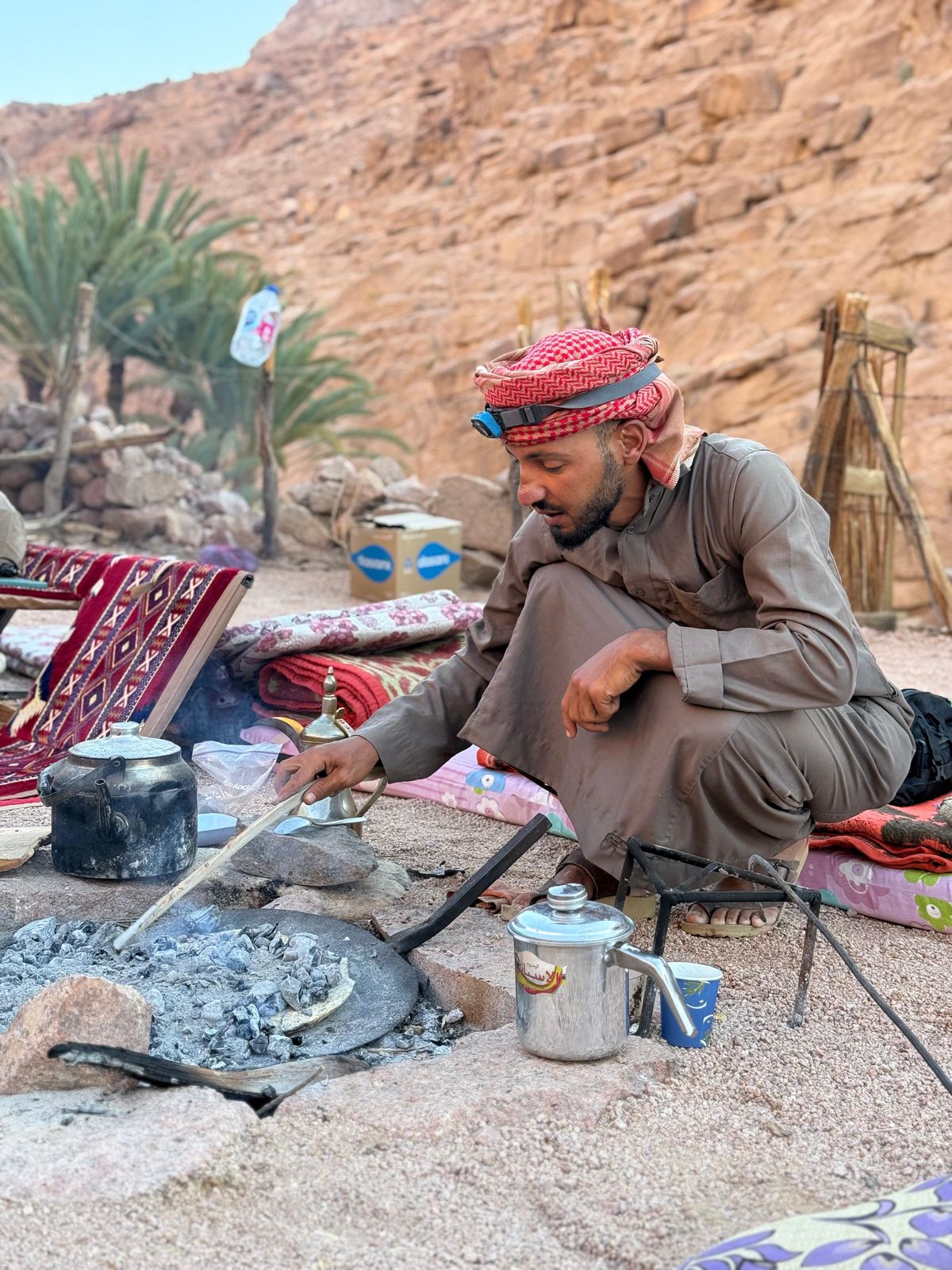
Throughout our hiking journey, surrounded by the diversity of wildlife at every turn, Mousa would pause to share his relationship with a particular plant or tree, and how it has shaped his life and his family’s life.
In Sinai, nature is in constant conversation with humans, even if that conversation is silent or no longer understood by most except the Bedouins.
When we stopped by a berry tree, Mousa picked some berries for each of us to taste, then shared a memory tied to it. “When I was young, my father and I brought a glass of ice and mixed the berries into it, and to this day, it is the best juice I’ve ever tasted,” he says.
“In any Bedouin house, there are three plants that can never be absent: oregano, thyme, and artemisia ” he says. “Artemisia is used in medicine. Many companies come here to collect it for pharmaceutical use. We’ve always used it as a common treatment for the stomach and for cramps.”
When we arrived at our campsite, with its cozy majlis-style seating arranged around the fire, we gathered in a circle to listen to Mousa’s stories about his life and about Sinai, as his team generously prepared fire-grilled chicken for us.
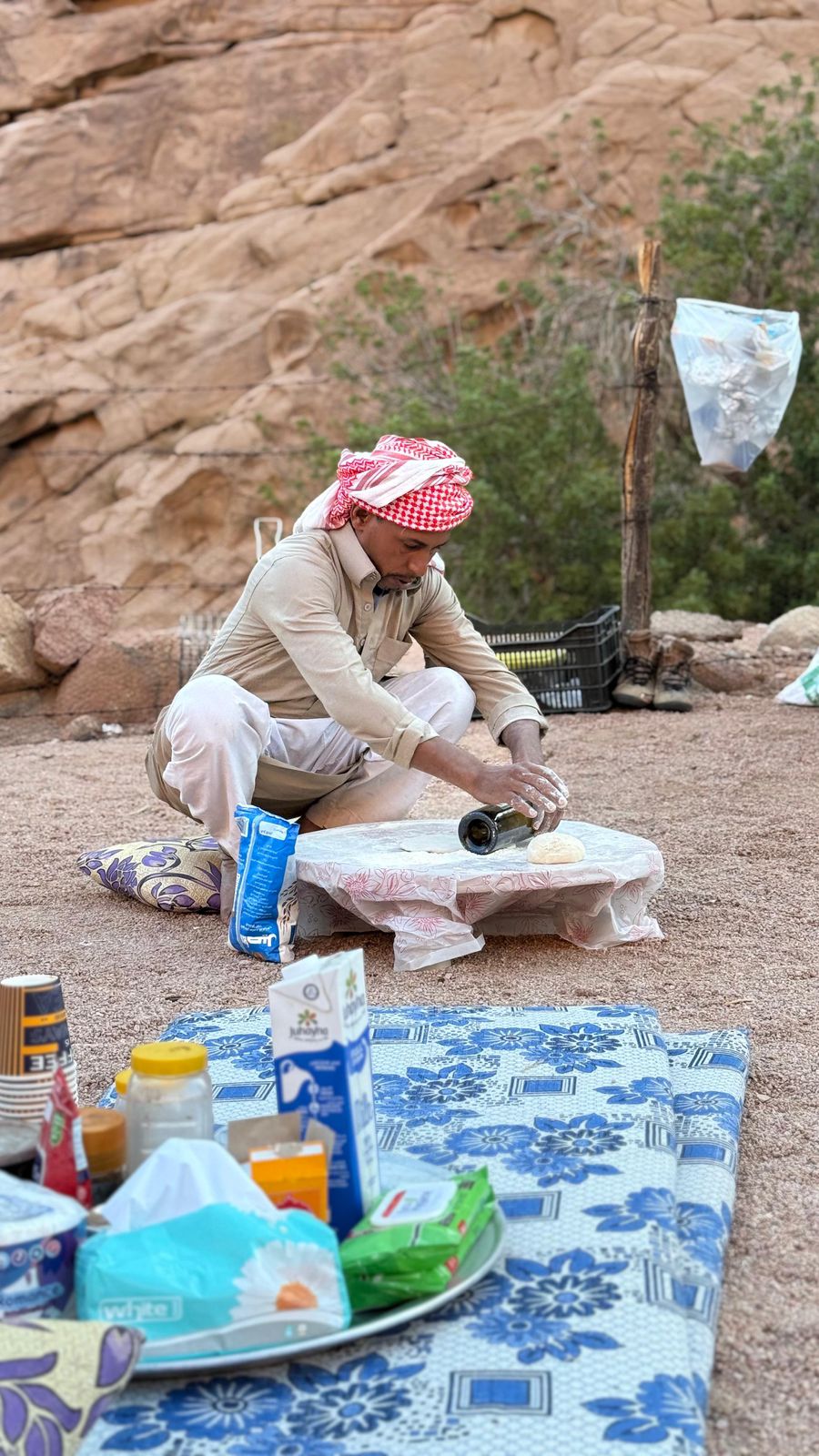
“People often hear stories that portray stereotypes of the Bedouin, like that we are not loyal or that we can easily break a promise, but that is the complete opposite of who we are,” Mousa explains.
“We have our own laws that govern our lives, such as respecting each territory without harming it, leaving it untouched, and following the natural cycles of plants and animals. These laws have allowed us to protect the environment. We never hunt a mature animal, so as not to disrupt the balance of nature,” he added.
Bedouin existence is rooted in laws that honor and respect both land and community, Mousa explains. Among these ancient codes is a practice known as al–Helf, which is the pact in Arabic.
When a helf was declared, every family in the tribe agreed that, for a season, a chosen stretch of land would be left untouched. No sheep grazed there, no camels wandered, no footsteps disturbed the soil. The earth was given time to breathe, so that its herbs, trees, and wildflowers could rise again in abundance.
When the pact ended, the families returned together, entering the land as one. What they found was renewal, as well as fresh shoots of green and blossoms opening. “Out of respect for their word, for the law of the tribe, and for the earth itself, the promise was kept.”
“It is as if the earth itself were saying: This is the reward for your respect, for me, and for your word, that you should find all this goodness.”
After a delicious dinner by the fire beneath a blanket of stars, the hours that followed were perfect for late-night meditation, with the sky and stars feeling so close you could almost touch them.
Before closing my eyes to sleep, I gazed upward and remembered Um Saad’s words of wisdom: the mountains are a blessing, the ground is a blessing, and nature itself is a blessing.
The Bedouin life in a modern world
The next morning, we woke to experience more of this blessing, not just through hikes and breathtaking mountain views, but also by visiting the homes and gardens of Bedouins like Dr. Ahmed Mansour, Mousa’s 77-year-old grandfather, who is the oldest and last remaining herbal medicine doctor in St. Catherine.
His dedication to his craft ran through every word and gesture as he spoke to us about the importance of knowledge, prioritizing education, and respecting all civilizations and ways of life.
“You cannot mix modernity with the Bedouin nomadic lifestyle,” he tells us. “Each way of life must be respected, and every lifestyle carries its own lessons and wisdom that we can learn from.”
Alone in the mountains, Mansour spent most of his days studying and reading. He has now established a school in his garden to teach future generations about herbal medicine, knowing that without preserving this knowledge, it could easily be lost.
As a Bedouin, he has learned a wisdom that has kept him healthy throughout his life: never to be angry. “My grandfather, the first physician, always advised me not to get angry,” he tells us. “When the inside of your heart is clean, free from envy and grudges, you will not get angry easily.”
In a world filled with anger, hate, and intolerance, his words felt like a glass of cold water, bringing a sudden clarity and a realization that city life rarely offers, where losing your temper often seems the easiest way to get what you want.
Towards the end of the trip, we met another remarkable Bedouin who embodies the spirit of Sinai. While Um Saad carried the spirit of the mountains and Mansour carried the spirit of the herbs, Selema Gabaly carried the spirit of art.
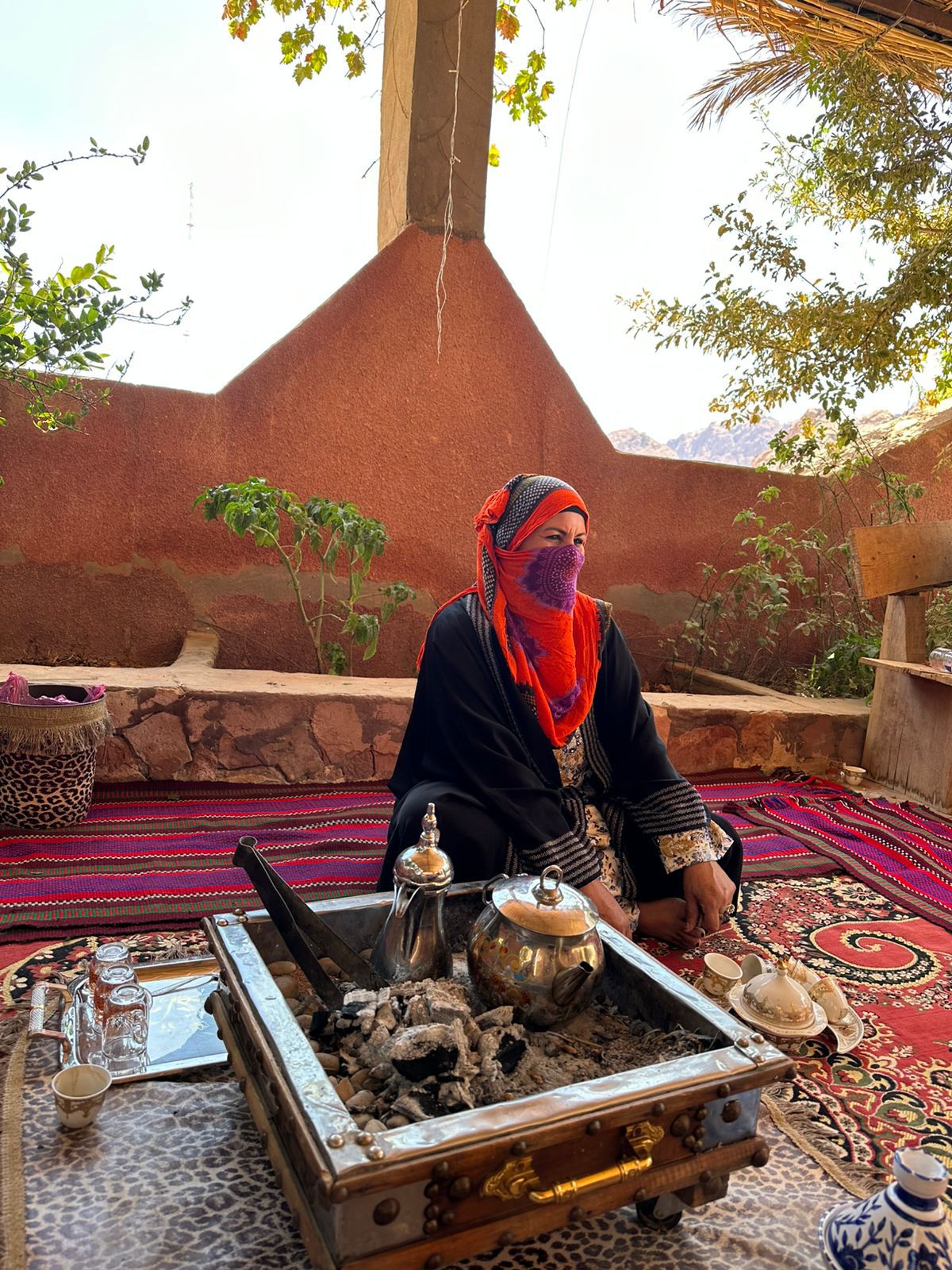
She kindly welcomed us into her home, served us tea, and shared her story of building her business, Fansina (Art of Sinai). Through it, she helps over 450 Bedouin women earn an income by selling their handcrafted goods both in Egypt and abroad. She also told us how she was the first woman in St. Catherine to attend school, and how, after her example, many Bedouin women now prioritize their education and careers.
“Bedouin women have always worked alongside their husbands, from tending the garden to caring for the animals. They were always working, but today we work differently through businesses,” Gabaly says.
“I am not just selling a product; I am sharing a piece of heritage. Each handicraft tells a story of nature, and every Bedouin woman brings her own artistic vision to how she depicts nature.”
Nature, I’ve found, flows in the blood of every Bedouin, as if it were the very tea they drink. As I left St. Catherine, I paused to take in the mountains and the beauty of the landscape, and I thought to myself, ‘How could anyone possibly be angry when surrounded by such beauty?’
In Sinai, it is easy to stay free of anger.
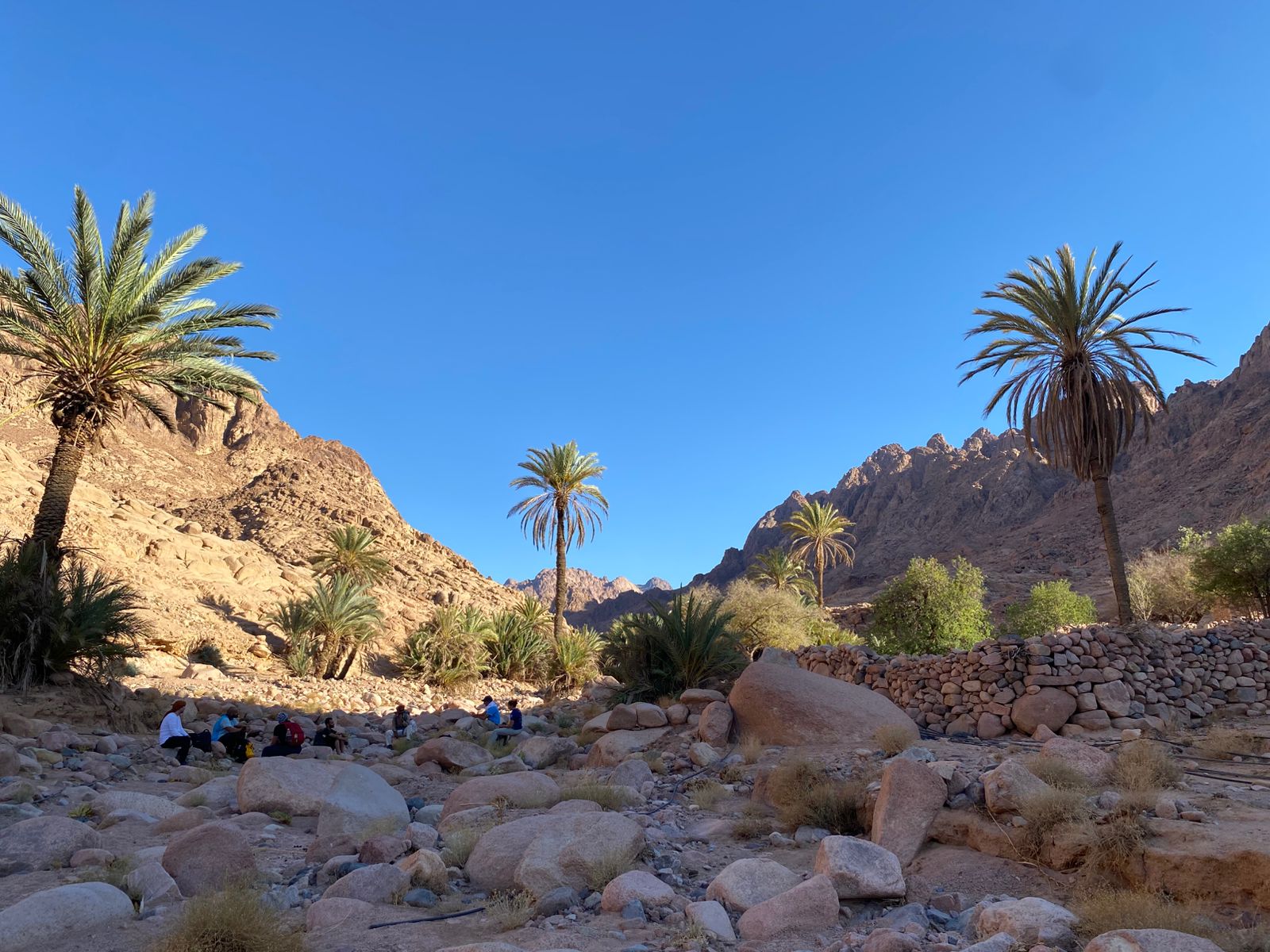



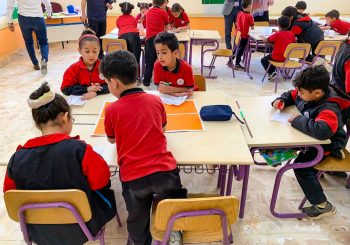

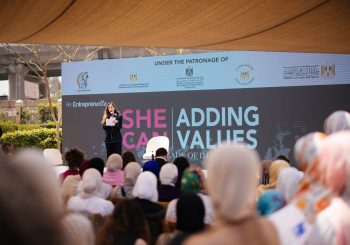
Comments (0)